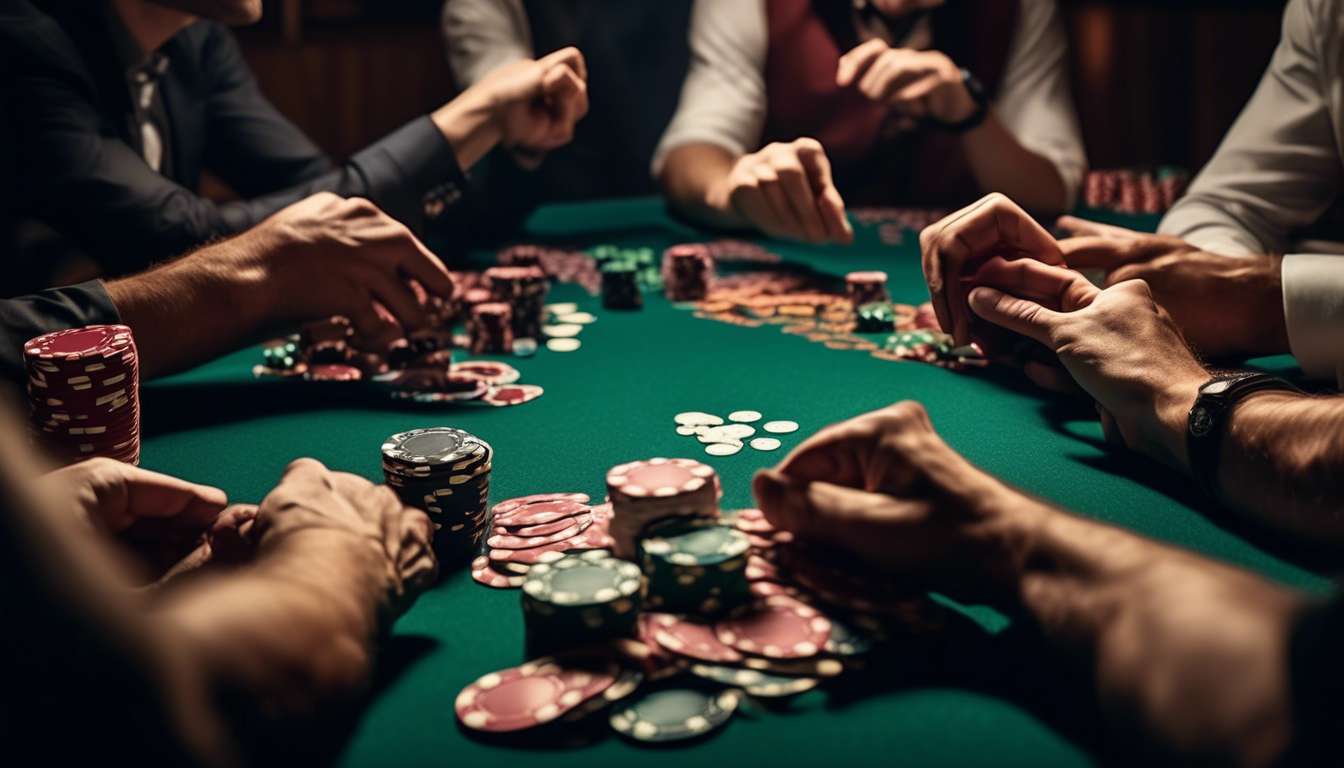In the world of poker, we all strive for that exhilarating moment when we cash in at a tournament. However, achieving consistent success in this competitive arena requires more than just luck. As passionate poker enthusiasts, we understand the challenges and nuances that come with each hand dealt.
Through years of playing and learning, we’ve discovered five secrets that can significantly increase our chances of cashing in regularly at poker tournaments. These strategies aren’t about gimmicks or shortcuts; they’re about refining our skills, sharpening our instincts, and making informed decisions at the table.
By sharing these insights, we hope to elevate our collective game and foster a deeper understanding of what it takes to succeed in this thrilling sport.
So, let’s dive into these tried-and-true strategies, ensuring that our next tournament sees us not just participating, but thriving and cashing in consistently.
Mastering Bankroll Management
Effective bankroll management is crucial for ensuring long-term success in poker tournaments.
By maintaining discipline with our funds, we can continue playing without the fear of going bust. It’s not just about having enough money to play; it’s about making smart decisions with our resources. We need to set limits and stick to them, understanding that our bankroll is the foundation of our poker career.
Incorporating strong positional play and bluffing techniques can enhance our game, but they must be supported by solid bankroll management.
- When we play from a strong position, we maximize our potential winnings and minimize losses.
This strategic approach helps us stay in tournaments longer and increases our chances of cashing in consistently.
By mastering these skills, we join a community of players who prioritize longevity over short-term gains. Together, we can thrive in poker tournaments, relying on a balanced approach that combines tactical play with financial wisdom.
Let’s make every decision count!
Reading Opponents’ Tells
Successfully reading our opponents’ tells can give us a critical edge in poker tournaments.
When we’re able to interpret their subtle signals, we gain insights that can guide our decisions and elevate our game. Understanding when an opponent is bluffing or holding a strong hand helps us make more informed choices, which is crucial for effective bankroll management. By recognizing these tells, we decrease unnecessary risks and maximize our profits.
As a community seeking to improve our skills, we can share and learn from each other’s experiences with tells.
- Observing how different players act under pressure
- Noting their behavioral patterns
These actions can strengthen our own bluffing techniques. Mastering this skill allows us to stay one step ahead, especially when combined with our knowledge of positional play.
Knowing when to fold, call, or raise based on reads can significantly impact our tournament outcomes.
Together, let’s hone this ability and secure more consistent cashes in our poker journey.
Perfecting Positional Play
In poker tournaments, our position at the table can significantly influence our strategy and decision-making. By perfecting our positional play, we create a sense of unity among us seasoned players, leveraging our position to maximize our bankroll management.
Late Position Advantages:
- We have the advantage of observing our opponents’ actions before making our move.
- This allows us to refine our bluffing techniques.
- We can apply pressure effectively.
Early Position Considerations:
- Requires a tighter range of hands.
- Acting first limits our ability to bluff effectively.
Middle and Late Positions:
- Our options expand.
- We can capitalize on the information gained from others.
Positional Play Strategy:
- It’s not just about aggression; it’s about strategic awareness.
- Understanding our table dynamics is crucial.
As we improve our positional play, we build a collective understanding of when to fold, call, or raise. Let’s focus on this aspect to ensure our bankroll remains healthy and our tournament cashes consistent.
Together, we can master this crucial element of poker.
Developing Patience and Discipline
Cultivating Patience and Discipline
Cultivating patience and discipline is crucial for making sound decisions and maintaining a steady course during poker tournaments. As a community of poker enthusiasts, we understand that these qualities help us navigate the highs and lows of the game.
Bankroll Management
By mastering bankroll management, we ensure that our resources are wisely allocated. This allows us to:
- Weather losing streaks without emotional turmoil.
- Wait for the right moments with patience.
- Avoid chasing losses through discipline.
Positional Play
In terms of positional play, patience and discipline are key. They help us:
- Assess table dynamics strategically.
- Stick to our game plan.
- Know when to fold or hold, maintaining our edge.
Refining Bluffing Techniques
As we refine our bluffing techniques, patience and discipline guide us. They prevent rash moves that could jeopardize our position.
Community Support
Together, we strive to create a supportive environment where these skills are valued. This leads us to consistent tournament success.
Utilizing Effective Bluffing Techniques
Mastering effective bluffing techniques requires a keen understanding of opponents’ behaviors and a strategic mindset. It involves observing how they react under pressure and recognizing patterns in their play.
Bluffing isn’t just about bold moves; it’s about timing and context. By integrating positional play, you can decide when to bluff based on your seat at the table and the action before you:
- Early position calls for caution.
- Late position offers more opportunities to apply pressure on others.
Bankroll management is crucial in your bluffing strategy. Ensure that your bluffs align with your overall financial strategy to avoid risking too much on a single hand. While a well-timed bluff can boost your stack, reckless moves can quickly deplete your funds.
In your poker journey, cultivating a sense of belonging with fellow players, learning from their styles, and honing your bluffing techniques will pave the way for consistent success.
Studying and Analyzing Hand Histories
Analyzing hand histories allows us to learn from past mistakes and identify patterns in our play and that of our opponents. By examining each hand, we can:
- Recognize where our bankroll management might’ve faltered.
- Determine how we can tighten our management strategies moving forward.
Together, we can improve our poker skills by delving into these histories. It’s a journey we share, ensuring we all grow as a community of players.
Positional play is another crucial aspect we analyze. Let’s pinpoint instances where we didn’t leverage our position effectively. By doing so, we can:
- Identify missed opportunities.
- Make strategic adjustments that enhance our gameplay.
Bluffing techniques are also essential to review. By analyzing our bluffs, we gain insights into:
- What worked and what didn’t.
- How we can refine our strategies.
As a group, we can exchange stories and strategies, fostering a sense of camaraderie and collective growth.
By working together, analyzing hand histories becomes a powerful tool in our arsenal, strengthening our resolve to consistently cash in tournaments.
Maximizing Value Betting Opportunities
To consistently cash in poker tournaments, focus on maximizing value betting opportunities. This involves:
- Identifying when you have the best hand.
- Extracting the most chips from opponents.
- Knowing when your hand is strong enough to bet for value.
- Exploiting your position to gain an advantage.
Positional play is crucial. Betting aggressively from late positions can often yield higher rewards because:
- Opponents act before you, revealing valuable information.
Bankroll management plays a vital role.
- Ensure you have enough chips to capitalize on value betting.
- Minimize risks and maintain stability in your tournament journey.
It’s not just about the cards we’re dealt; it’s about how we manage our resources.
Bluffing techniques can complement value betting. By creating a misleading image:
- Coax opponents into calling your value bets more frequently.
As a community, mastering these strategies will strengthen our game and help us thrive in the competitive world of poker.
Embracing Continuous Learning and Improvement
Continuous Learning and Improvement
To consistently cash in poker tournaments, it’s essential to embrace continuous learning and improvement. This approach helps sharpen our skills and adapt to the ever-evolving strategies of the game.
We’re not just players; we’re a community striving for mastery together.
Bankroll Management
It’s crucial to constantly review our bankroll management strategies. This involves:
- Ensuring that we’re playing at stakes that suit our financial limits
- Avoiding unnecessary risks
- Securing our long-term success
Positional Play and Bluffing Techniques
Improving our understanding of positional play is vital. By learning to leverage our table position, we can:
- Make more informed decisions
- Capitalize on our opponents’ weaknesses
Additionally, mastering bluffing techniques is powerful. By studying how and when to bluff effectively, we can:
- Keep our opponents on their toes
- Maintain control of the game
Community and Collaboration
As a collective, let’s:
- Seek out resources
- Discuss strategies
- Learn from each other’s experiences
By valuing growth and collaboration, we’ll consistently enhance our performance and solidify our place in the poker community.
Conclusion
Congratulations on mastering the secrets to consistent poker tournament cashes!
By implementing the following strategies, you’re well on your way to becoming a successful poker player:
- Effective bankroll management
- Reading opponents’ tells
- Perfecting positional play
- Developing patience and discipline
- Utilizing bluffing techniques
- Studying hand histories
- Maximizing value bets
- Embracing continuous learning
Keep honing your skills, staying focused at the tables, and adapting to different situations. Your dedication and effort will surely pay off in the long run.
Good luck at the next tournament!

